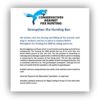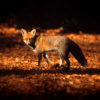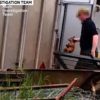 Written by Douglas Batchelor, CEO of The League Against Cruel Sports charity on 13 May, 2011 : 09:11
Written by Douglas Batchelor, CEO of The League Against Cruel Sports charity on 13 May, 2011 : 09:11
One of the most basic arts of campaigning is working out where to stand your ground and where to yield ground. In the current political climate you can hear and see politicians of all parties manoeuvring to gain the position that they judge to be the strongest.
The recent rumblings from DEFRA suggest that the government are seriously concerned about the negative public relations impact of any move to license badger culling. At a time of year when BBC Springwatch usually shows lots of cute pictures of badger cubs at play, the government could be setting themselves up to license badger killing by groups set up to shoot to kill and injure free running badgers.
The media managers are already hard at work trying to get the positioning right. They say that bovine Tuberculosis (bTB) is costing the lives of thousands of cattle every year, that bTB is a risk to public health, that bTB has an effect on British meat exports, and the big one; that violent animal rights activists are threatening direct action against the cull.
The truth is somewhat different to the very selective facts that are being used in the campaign to support a cull. First and foremost there is widespread agreement among scientists that there are reasonable and viable alternatives to a cull. Vaccination for badgers and stricter movement and contact controls for cattle are both possible, but clearly both are more expensive than simply allowing farmers or their agents to shoot at badgers.
Any decision to allow farmers and others to kill badgers is simply a decision to make the farmers pay for the costs of the cull and is clear evidence of a government decision not to fund the costs of a vaccination programme.
Any decision to license killing will turn badger shooting into a new countryside bloodsport. Badgers will become targets for what is a new bloodsport where the victim or target is being classed as a diseased pest. No doubt licensed badger killing for sport will soon be followed by licensed deer killing and licensed hare killing, in areas where deer and hares are already considered by some to be pests.
When it comes to foxes and rabbits, stoats and weasels, all could be classed as pest species and become targets for a good day’s sport. Anyone with a license will be able to call themselves government-licensed pest controllers. Any species not near to extinction could become a government approved target for sport.
It is high time we asked some searching questions about this new government policy of so-called wildlife management. It doesn’t take a genius to work out that there is a connection between the falling bee population and modern agricultural practices, and nor does it take a genius to work out that there is a connection between falling bird populations and modern agricultural practices. It also doesn’t take a genius to work out that if birds, bees and foxes are thriving in the towns, there must be something going wrong in the countryside.
Now we are hearing calls for otter, raptor and beaver control. It seems that the government’s wildlife management policy is predicated on management by death, and that it is a commercial bonus if the chance to kill can also be packaged up as a new sporting opportunity.
Already the previous Chief Executive of the Countryside Alliance, Simon Hart MP, is suggesting that the UK consider adopting a version of the New Zealand system, where the government licenses all wildlife killing, whether it be hunting, shooting or fishing and uses the license fee income to cover the government’s related administration costs.
From a political perspective delegating to some new Wildlife Control Commission (WCC) all responsibility for licensing hunting shooting and fishing might seem very attractive. At a stroke difficult issues like bTB and badgers would be swept into the new WCC. No doubt the WCC would be stuffed full of bloodsports enthusiasts who would set the license conditions and ensure that good sport could be had by all those sporting enthusiasts issued licenses to hunt, shoot and kill wildlife.
From a political perspective, turning wildlife control into a government profit centre would seem like a smart move. At a stroke, all hunting, shooting and fishing would be subject to new and much higher government license fees. Provided that the license fees were set high enough, the government could tax these new leisure activities and at the same time claim to be helping to manage the wildlife by selling off licenses for allegedly controlling disease and sustainably harvesting the nations wildlife for sport.
Some other bright spark would no doubt add to the list of licensed activities all the wildlife killing that is currently allowed subject to general license, such as corvid and pigeon control and perhaps also the Brant goose in the run up to Christmas.
The hunters would be delighted. They would no longer be hunting for sport; it would be all about licensed pest control, courtesy of the WCC. It must look like a fantastic opportunity for them, complete with no need to repeal the Hunting Act, because their sport could now become a licensed pest control operation.
There is however a massive financial road block in the hunters way to their planned salvation as licensed pest controllers. If all the things that used to be bloodsports were to become subject to pest control licensing to legitimise them, their sporting rights worth 20% of property values and hundreds of millions of pounds, would have to be nationalised without compensation. Once that commercial truth sinks in, I cannot imagine the legislation establishing the WCC getting through the House of Lords even if it scraped through the House of Commons. Nationalisation of sporting rights? Tally NO!
What we really need in law, is a level of protection for wild animals from cruelty and exploitation. We need it to be a crime to kill for sport and we need the government to fund research into diseases, and where necessary treatment, for wild animals where that is necessary or appropriate for the welfare of both farmed and wild animals.
Wild animals are an essential part of our landscape and eco-system and we should be doing all that we can to support their health and welfare rather than turning them into targets for bloodsports. That is why we should be saying no to the badger cull. Licensed killing of wildlife isn’t the way to solve bTB or other problems in the countryside






